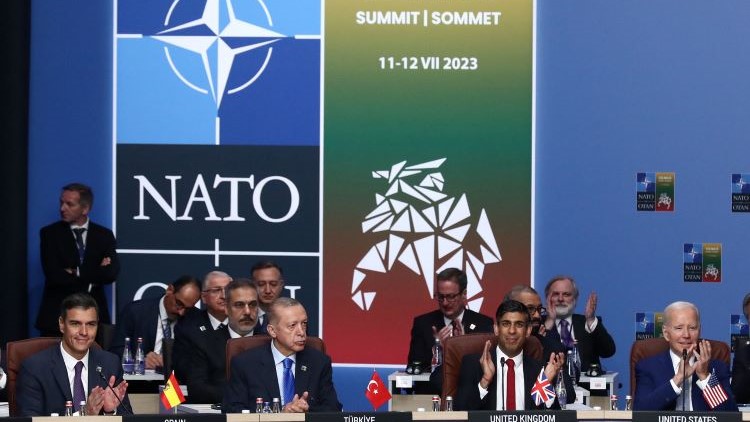The Diplomat
The President of the Government, Pedro Sánchez, yesterday took advantage of his participation in the NATO summit in Vilnius to hold a bilateral meeting with the President of Turkey, Recep Tayyip Erdogan, who asked him to speed up the process of his country’s accession to the Union during the Spanish Presidency of the Council of the EU.
During the meeting with Sánchez, according to government sources, the Turkish President requested that during the Spanish Presidency Turkey’s accession process be reactivated, coinciding with the recent approval of the candidatures of Ukraine and Moldova. Turkey has been an associate member of the EU since 1963 and has had a customs union agreement since 1995. It has also had official candidate status since 1999. In 2003, Erdogan pushed through numerous reforms to facilitate entry into the Union, such as the abolition of the death penalty or the improvement of the rights of the Kurdish population in the east of the country.
Accession negotiations began in 2005. However, of the 35 chapters needed to complete the accession process, only 16 have been opened and one has been closed. In 2015, the European Commission published a report critical of Turkey’s accession on the grounds that the country violated the Copenhagen criteria for EU membership and, in 2016, the European Parliament voted to “freeze” accession negotiations, which have been at a standstill since that year, despite a brief resumption following the agreement between Turkey and the EU on the reception of refugees. Apart from that, Turkey is particularly hurt by its insistence on not recognizing the territorial integrity of the Republic of Cyprus, an EU member state.
In his response, as reported by the Prime Minister himself at the press conference following the summit, Sánchez assured Erdogan that the Spanish Presidency-in-turn will try, “to the extent of its possibilities”, to help the pending issues relating to Turkey’s European aspirations “to move forward”, but recalled that this issue depends on the decision of all Member States. “We have to see exactly how we can take steps over these months so that Turkey can feel closer and not further away,” he stated.
The two leaders also discussed preparations for the eighth high-level meeting between Spain and Turkey, to be held in Spain. The previous summit, held in Ankara in November 2021, ended with controversy after Erdogan assured at the press conference that Turkey was interested in acquiring Spanish military equipment. As a consequence of these words, the Greek government summoned the Spanish ambassador in Athens to express its displeasure and the Minister of Foreign Affairs, José Manuel Albares, was forced to travel to Greece and Cyprus to calm tempers.
The meeting between Sánchez and Erdogan took place in the middle of an intense agenda of bilateral meetings by the Turkish leader, especially with other EU leaders, such as the president of the European Commission, Ursula von der Leyen; the president of France, Emmanuel Macron; Italian Prime Minister Giorgia Meloni, German Chancellor Olaf Scholz, Dutch Prime Minister Mark Rutte and Greek Prime Minister Kyriakos Mitsotakis, as well as U.S. President Joe Biden, British Prime Minister Rishi Sunak and Canadian Prime Minister Justin Trudeau.
Erdogan’s presence in Vilnius took on special significance with his decision to lift the veto on Sweden’s NATO membership. The agreement was announced Monday by Alliance Secretary General Jens Stoltenberg after meeting in Lithuania with the Turkish president and Swedish Prime Minister Ulf Kristersson. Erdogan had warned, hours before the agreement, that his country would only accept Sweden’s accession to NATO when Turkey was accepted into the European Union. In any case, the Turkish leader did not specify when he would submit the proposal to his country’s Parliament. Turkey had blocked Sweden’s accession in retaliation for the presence of Kurdistan Workers’ Party (PKK) militants in the Nordic country.







